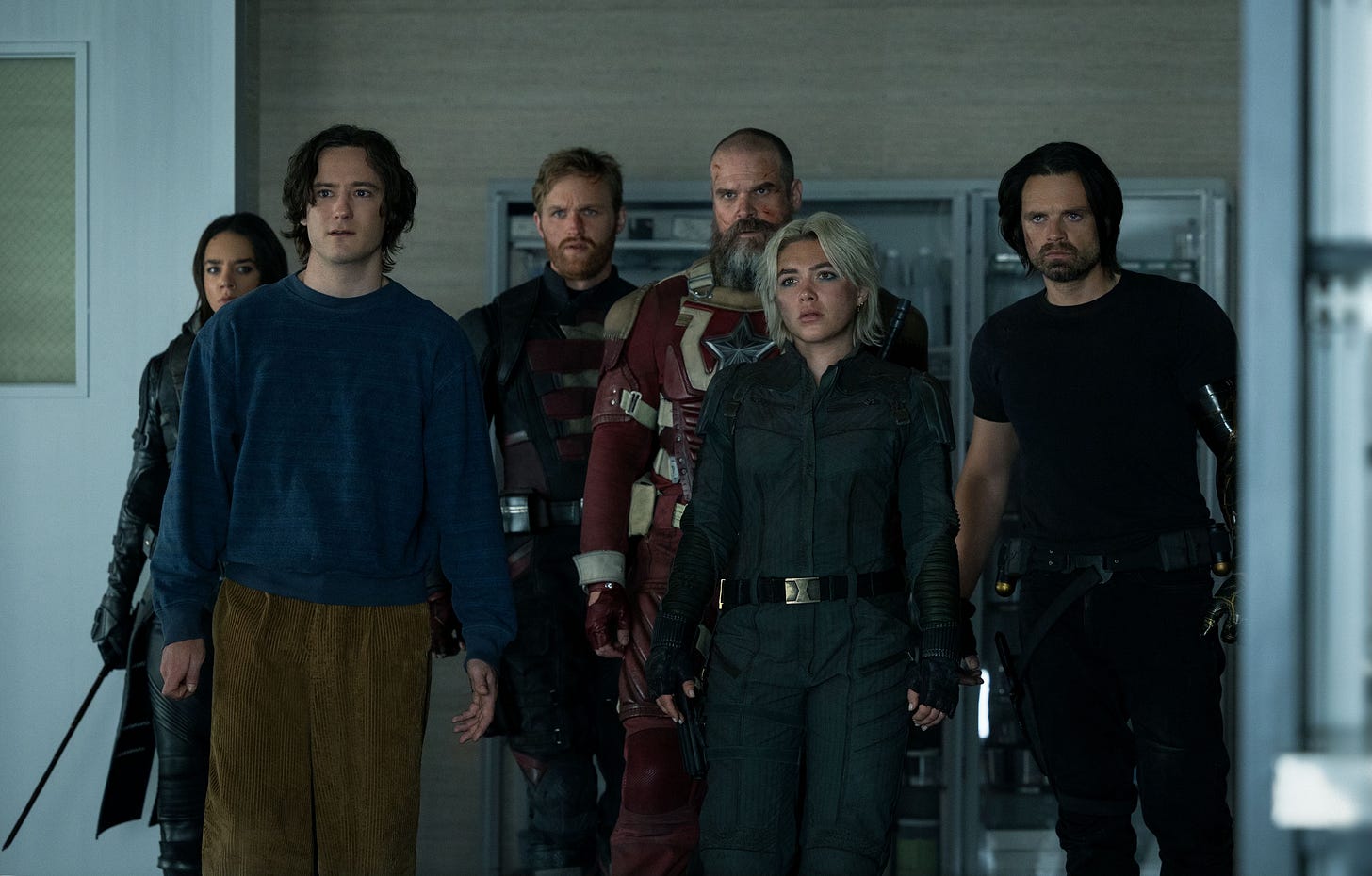Thunderbolts*
A reminder of what a good superhero movie can be.

I wrote in my review of Captain America: Brave New World that superhero movies remind me of professional wrestling. It’s partly in the muscles and the costumes, but more important are the story arcs, the characters who represent ideals, the fact that a villain—a “heel” in wrestling parlance—can turn “face,” or go heroic. Brave New World failed because it expected the audience to root for its characters solely because the script dictated that they were the good guys, with no evidence to back its claims up. Thunderbolts grounds its story in its characters and their emotional landscapes. On paper, it shouldn’t work; the movie is the thirty-sixth entry in a long-running, exhausted franchise and is populated by a loose conglomeration of former villains and minor antiheroes from previous entries in the Marvel Cinematic Universe. But Thunderbolts does work, and it works well, because it’s less interested in saving the world than it is in the wants and needs of its protagonists.
Yelena Belova (Florence Pugh) is trying to go straight after years of covert operations, much like her late sister Natasha Romanoff (played by Scarlett Johansson in previous MCU movies). Yelena’s father, Red Guardian (David Harbour), feels stuck in a dead-end job, longing for the days when he was a symbol of pride for the Soviet Union. John Walker (Wyatt Russell) wants respect and acclaim, though he has a hard time holding it because of his temper and his reputation as a cut-rate copy of Captain America. Ava Starr, a.k.a. Ghost (Hannah John-Kamen), just wants to disappear. And Bucky Barnes (Sebastian Stan) has been elected to the House of Representatives as a way to try to make good for the years he spent in the shadows as the Winter Soldier, though he chafes at the protocols and slow pace of the government. None of them has any reason to trust anyone else. All of them are running from their respective pasts and from the awful thought that perhaps there’s nothing left for them beyond the choices that led them to where they are. They think of themselves as being alone. When they’re brought together by circumstance in the form of a death trap, they are forced to work together to survive.
The story has stakes because each of its players want something and those motivations are at odds: a far cry from the past few Marvel movies where the only motivation is the franchise’s inexorable, unearned movement toward its next installment. Marvel’s comic-book characters are most compelling when they’re at their most human, grappling with real-world issues alongside their more “super” problems. Iron Man is an alcoholic in recovery; Spider-Man is a high schooler trying to figure out who he is as a person. Thunderbolts’s protagonists do their best to get by in a world that neither understands nor values them. Most of them are literal castoffs, loose ends discarded the moment they became more of an inconvenience than an asset.
That outside motivation alone would be compelling, but Thunderbolts deepens its characters’ motivations by exploring their interiority, especially Yelena’s. She knows something is wrong, though she can’t put her finger on it. “There’s something wrong with me. An emptiness,” she says flatly, then deadpans that the void she’s trying to run from could be sadness over the loss of her sister … or else it could just be boredom. Either way, she doesn’t want to face up to that void. Nor does she want to show her vulnerability, which, along with her difficult past, could be exploited. And that’s precisely what makes Thunderbolts hit: its characters each have a purpose, desires, and motivations beyond plastic representations of half-baked ideals. The movie understands their driving motivations even when the characters don’t yet know how to articulate it for themselves.
The script is broad, yet smart enough to fill in any missing blanks. You don’t need to remember some line from the third episode of a streaming series to understand where these characters came from. They carry the weight of their own personal histories without getting hobbled by trivia. Even more refreshing: Thunderbolts is genuinely funny without constantly trying to hit the same snarky note set by Robert Downey Jr.’s Tony Stark. Up to this point, the MCU has been cocky, and the attempts to replicate Downey Jr.’s tone have mostly served to underline his character’s absence from the series in recent years. That tone is picked up by the unsavory Valentina Allegra de Fontaine, and it works only because she’s played by Julia Louis-Dreyfus and because the character is deployed judiciously. As for the rest of the script, Yelena’s sense of humor is more self-effacing than ironic; Red Guardian’s comic relief is even more welcome because Harbour throws himself into the earnestness of a character who lacks self-awareness with his whole body. (Harbour and Pugh are especially fun when they’re on screen together.)
The story is still more of a sledgehammer than a scalpel. Despite its emotional intelligence, the movie can’t help but drive home its point loudly enough that you can hear the lesson it’s trying to impart from a few blocks away. Thunderbolts is still a superhero movie, with all the sound and bombast that the genre entails. But it’s a reminder of what a good superhero movie can be: a story of broken people trying to do right. An ideal, albeit not a perfect one. I didn’t think I wanted it, but it gave me exactly what I needed.—Sarah Welch-Larson
★★★☆
Thunderbolts is in theaters nationwide now.


